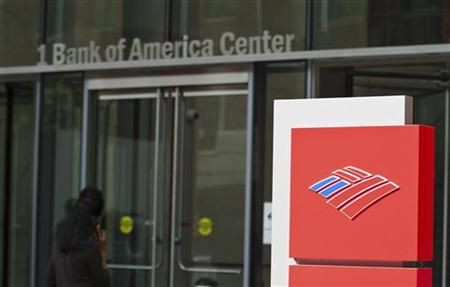Bank of America Debit Card Backtrack Won't End More Fees

Once Bank of America announced it was dropping its $5 montly debit card fee, consumers may have felt that they won a major battle.
But the large banks aren't exactly relenting on gaining new revenue from their customers. Rather, the banks are raising existing fees and tacking on new fees, often without the public relations headache that the debit-card fee caused.
Citigroup began charging $10 a month on basic checking accounts in November, up from $8 previously, while TD Bank will charge $15 for domestic wire transfers starting next month and U.S. Bancorp is now charging 50 cents a check for customers who deposit money with a mobile phone, according to the New York Times.
"The debit card fee is only one lever that they can pull," Greg McBride, a senior financial analyst with Bankrate.com, told the International Business Times.
In September, Bank of America announced it was charging a $5 monthly fee on checking accounts, sparking anger from many customers. The company said the move was necessary after recently enacted federal laws limited the amount of money banks could obtain from merchants accepting debit cards, as well as the amount on overdraft fees that could be charged.
However, once rivals backed off their plans to implement their own debit card fee, Bank of America followed suit.
"We have listened to our customers very closely over the last few weeks and recognize their concen with our proposed debit usage fee," David Darnell, co-chief operating officer of Bank of America, said in a statement given to IBTimes at the time of the announcement.
"Our customer's voices are most important to us. As a result, we are not currently charging the fee and will not be moving forward with any additional plans to do so."
But Bank of America also raised its fee on MyAccess checking account by more than $3 this month, the Times reported, with accounts now costing $12 a month. The fee increase didn't spark the outrage that the debit card fee did.
Banks ratcheting up fees isn't new. Many banks have eliminated their debit rewards programs. Free checking accounts are slowly becoming a thing of the past. According to Bankrate.com, 76 percent of basic checking accounts were free in 2009. By 2011, that number dropped to 45 percent.
McBride pointed out that along with raising fees, banks may also lower the amount of interest paid on accounts, which could save the banks millions. According to a recent report by Market Rate Insights, banks can generate an additional $1.5 billion in revenue a month just by lowering deposit rates as little as 0.01 percent a month, something customers are less likely to notice.
However, members of the Bank Transfer Day group on Facebook, which gained attention in the midst of the Bank of America debit fee news coverage, have noticed. The page pointed out Monday that 690,000 consumers moved about $4.6 billion to credit unions in the last four weeks, and the group still encourages others to make the switch to credit unions.
Credit unions have been trying to capitalize on the movement.
"Recalling debit fees now are like trying to get toothpaste back in the tube. It simply does not work," National Association of Federal Credit Unions President Fred Becker said in a statement once Bank of America dropped its debit card fee proposal.
Banks are willing to waive fees depending on the relationship between the company and the customer -- the more services the customer uses, the more the banks lay off the fees. Fees are often waived on accounts maintaining a minimum balances, and people can sometimes avoid bank fees if they have a mortgage, credit card or investment account with the bank.
"The banks want to transform unprofitable accounts to profitable accounts," McBride said. "Or they want to push the unprofitable accounts out the door."
© Copyright IBTimes 2024. All rights reserved.





















